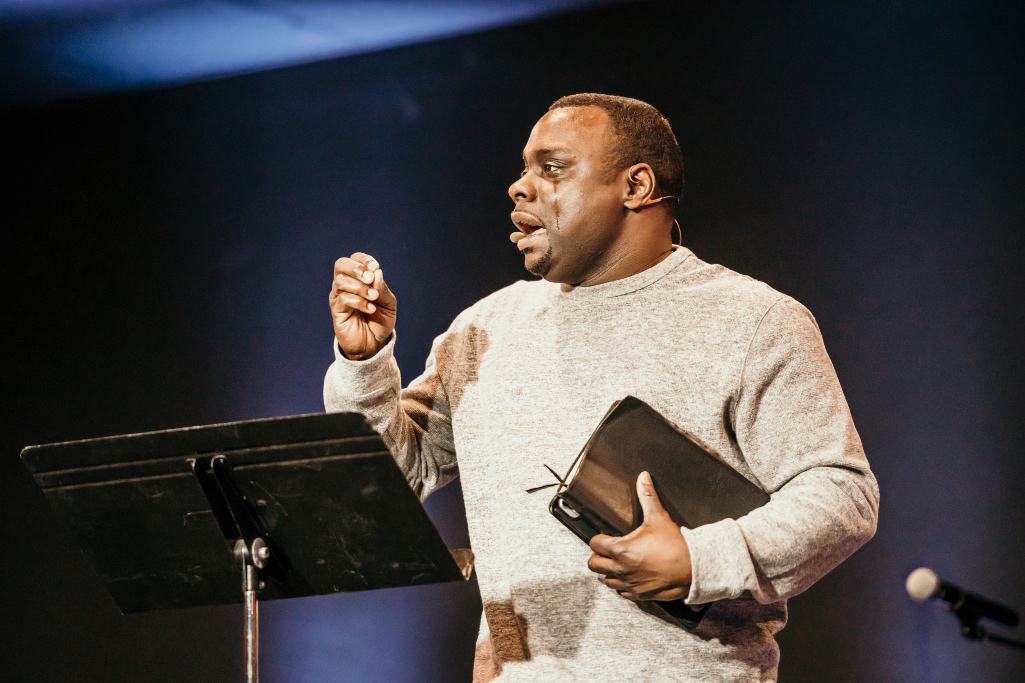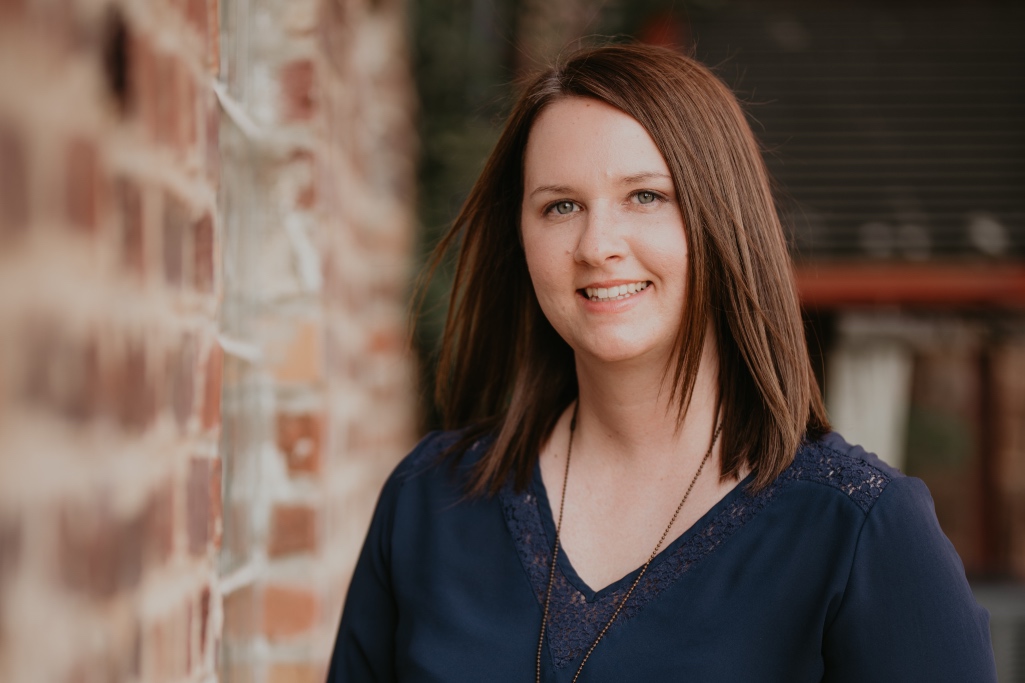
State convention president Quintell Hill says he wants to encourage N.C. Baptists to come together – regardless of race or social setting – to be on mission together.
There’s a reason you can’t go long in a conversation with Quintell Hill without hearing the gospel.
It’s simple. The gospel is his life story.
“My story is the gospel – just the gospel,” said Hill, the newly elected president of the Baptist State Convention of North Carolina and pastor of Multiply Community Church in Monroe. “The gospel transformed my life. Today, it motivates me. It wakes me up.”
Born in Chicago, Hill, his mom, and his two brothers moved to Birmingham, Alabama, when his parents divorced as a child. Although he grew up attending church with the rest of his family, he had little interest or understanding of the gospel. Church was just something you attended, whether or not you wanted to – and usually Hill didn’t want to be there.
Instead, Hill wanted to play basketball, nearly every minute of every day. Anything that got in the way of sports was a distraction – whether that was school, church, or other hobbies. Dreaming of playing in the National Basketball Association, Hill would play basketball whenever and wherever an opportunity arose.
When a friend in class invited Hill to play basketball at his church on Saturday, Hill didn’t hesitate. The church had a basketball team, and the youth minister served as its coach. To play on the team, Hill had to attend church at least one day a week. Every Sunday, the church had Krispy Kreme donuts for guests.
“Wow, this is church?” Hill thought. “I get to play basketball and eat donuts. I’ll do this.”
Yet Hill, who is black, clearly didn’t look like everyone else in the all-white Southern Baptist church. The experience was a culture shock for him, particularly the preaching and the music, which were much different than the churches he attended as a child. But Hill also noticed something else different about the people at this new church. They loved him.
For the next several years, Hill attended the church sporadically. Then, at age 15, he showed up for a youth testimony night where he heard other teenagers share their stories of how God had saved them.
“I knew if I died that night, I would bust hell wide open,” Hill said. “To this day, I can’t describe what happened. God just opened my eyes. I walked down the aisle in a traditional invitation service. I prayed to receive Christ and couldn’t stop crying. I got into the church van and cried all the way home.”
To this day, Hill says, he has never gotten over what God did in his life that night.
Yet God wasn’t even close to done.
“I had a gospel heart-attack that night,” Hill said. “Those who are in Christ are a new creation, the old is gone and the new has come. I just wanted to be around God’s people.”
Hill’s home life had been difficult, including drugs in the home and drive-by shootings. For him, River Road Baptist Church became a safe place to grow. Thanks in large part to the church’s senior pastor, Steve Garland, and youth minister, Jamie Weathers – two key mentors in those early years of his Christian walk – Hill grew.
As that happened, basketball slowly started taking second place to the work of God in Hill’s life. At 16, God began calling him into full-time ministry, a prospect that seemed incomprehensible to the young man at the time. Hill didn’t know much about what it meant to be in ministry, but he thought college was likely a prerequisite.
Born with a learning disability, Hill says he only read one book throughout his time in school – Dr. Seuss’ “Green Eggs and Ham.” With little money and a poor academic background, a college education seemed impossible. As Hill discovered, God specializes in the impossible.
When the president of the University of Mobile, a Baptist-affiliated college in Alabama, spoke at his church, Hill met him and shared his story. Mark Foley, who retired as president of the University of Mobile in 2015, offered Hill a full scholarship to the school.
By the time Hill graduated from the University of Mobile, he had made the dean’s list.
“God had this call on my life,” Hill said. “I didn’t know what the path was going to be, but the Lord made a way.”

Right after graduation, Hill married Christie, a Charlotte, N.C., native. The two moved to Wake Forest, N.C., right after graduation so Hill could start in the master of divinity program at Southeastern Baptist Theological Seminary (SEBTS).
“That school shaped me in so many ways, in how I think about the mission of God, the Great Commission,” Hill said. “God is at work. He’s a missionary, and therefore we should be a missionary people.”
As Hill looked for ministry positions during seminary, he ran into racial prejudice that may have deterred others. For example, one time he applied for a youth ministry position at an Alabama church. The church responded favorably, offering to bring him to town for an in-person interview. The person who wrote the email offered to let Hill stay with him when he arrived in town.
As a precaution, Hill told the man that he was black, and his wife was white. The church responded by telling Hill he was no longer a candidate for the position. Older people in the congregation just wouldn’t understand, Hill was told.
SEBTS President Danny Akin, who became a mentor of his during seminary, encouraged him not to give up. “He told me, ‘You don’t want to go to churches like that anyway, God has a place for you,” Hill remembered Akin saying.
In time, the missional passion Hill caught at SEBTS led his family to plant a new multicultural church in Monroe, N.C.. Throughout his time in Alabama, seminary, and serving as a youth minister in Georgia and North Carolina, Hill spent time in strong churches, where he learned much about ministry, but it still left him with a question.
“Why am I the only black person in all these places?” Hill asked. “This is God’s family. Shouldn’t we all be together? There was always something inside of me that wanted to see God’s people come together. There was this holy discontent.”
Church planting, Hill would discover, became an opportunity for him to answer that question and pursue building a church that looked like heaven. In his bio on the Multiply Community Church website, Hill notes that when the church on earth reflects the church in heaven “the unity of the body gives gospel witness to a lost world.”
The Hill family – which includes two adopted daughters, Moriah and Kharis – worked together to plant the church. Hill notes the church was just the four of them at first. They still go out together, door-to-door in the community, sharing the gospel and inviting people to church.
Hill has learned that he can’t reach Monroe on his own. Multiply partners with a local nonprofit Heart for Monroe to help meet the community’s physical and spiritual needs. The church also partners with churches in the Union Baptist Association to engage people near their community through the Hope House.
Eric Cook, the associational missional strategist with the Union Baptist Association, says he has seen a pastor in Hill who partners with other like-minded churches in the area to carry the gospel to the nations.
“If we had more Baptist leaders like Pastor Quintell, there’s a good chance we might see a spiritual awakening across our state, [with] guys who are singularly focused on making Jesus Christ preeminent in all the earth,” Cook said. “His passion for the gospel drives all he does.”
Hill says he decided to allow himself to be nominated for the convention presidency because, first, God told him to do it. Second, he remembers the investment River Road Baptist Church in Hueytown, Alabama, made in him. “Those people loved me. I’m indebted to them,” Hill said. “I’m going to give back because of what they’ve done for me.”
Hill says he is excited about the direction of the Baptist State Convention of North Carolina. He wants to encourage North Carolina Baptists to come together – regardless of race or social setting – to be on mission together.
“People need encouragement,” Hill said. “We’ve had COVID, racial strife, political strife. We need the body of Christ to stay on mission because the world needs us.”
Hill hopes to see North Carolina Baptists continue to go outside of their comfort zones to share the gospel. When they do, he notes, they may reach someone very different with the gospel, someone like him.
“I’ve learned in my life that I’m going to keep the main thing, the main thing,” Hill said. “When you keep the main thing, the main thing, God puts you in places and spaces – not to elevate you, but to elevate His name. That’s what my story is all about.”
(EDITOR’S NOTE – Tobin Perry is a freelance writer with more than 20 years of writing experience with Southern Baptist organizations. He can be reached at TobinPerry.com. This article originally appeared in the January 2023 issue of the Biblical Recorder magazine.)

